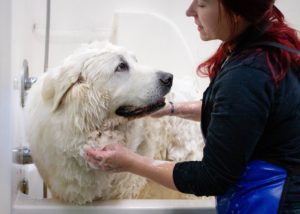Don’t you just love this time of year? Springtime brings warmer weather and blooming flowers, but it also brings irritating seasonal allergens for humans and dogs. That’s right, environmental allergens, like pollen, grass, weeds, dander, mold, and insects, can affect dogs too.
Seasonal allergies in dogs are very common and they can cause a lot of discomfort and pain. Most symptoms are skin-related, but dogs with seasonal allergies can also suffer from ear infections and respiratory issues. If left unchecked, your dog’s seasonal allergies could become a bigger and more persistent problem.
Common Symptoms of Seasonal Allergies in Dogs
There are many symptoms that could indicate that your dog is suffering from seasonal allergies including:
 excessive scratching
excessive scratching- itchy and runny eyes
- scratching the ears, head shaking, and frequent ear infections
- clear runny nose and sneezing
- red, irritated skin
- hair loss
- hot spots
- excessive chewing and licking of paws
- inflammation or sores on the paws
How to Treat Your Dog’s Seasonal Allergies
If your dog is exhibiting one or multiple symptoms listed above, you should have your vet take a look. If left untreated, ear infections, hot spots, and sores on the skin and paws could lead to bigger issues, like painful infections. Depending on the severity, your vet may prescribe topical and oral medications or even allergy injections for moderate to severe cases.
How to Manage Your Dog’s Seasonal Allergies at Home
Seasonal allergies in dogs can often be managed at home. Here are a few ways you can prevent or alleviate symptoms:
 Avoid Allergens
Avoid Allergens
One of the most effective ways to eliminate your dog’s seasonal allergies to limit exposure to allergens, but that’s easier said than done! After outdoor walks, make sure to wipe off your dog’s paws and underside to remove allergens from his fur and skin. If running and rolling around on the grass is making Fido itch like crazy, take him to an indoor doggie daycare, like Paws Pet Resorts, where he can run and play without being exposed to irritating allergens.
Use Scratching and Chewing Deterrents
If your dog just can’t stop scratching and chewing, use a soft cone, e-collar, or even some socks over his paws to deter the behavior. You can also try to distract your dog with a long-lasting treat, like a frozen Kong filled with peanut butter, or a puzzle game to keep him busy, like the ones we use at Paws.
Flea Preventative
Flea allergy dermatitis is a very common seasonal allergy in dogs. Using an effective yet safe flea preventative can help protect your dog from flea bites. Consult with your vet to find the best solution for your dog.
Fatty Acid Supplement
Give your dog an omega fatty acid supplement to support skin and coat health. Fatty acid supplements can help reduce and resolve inflammation, as well as reduce shedding and promote growth of the undercoat.
 Regular Bathing and Grooming
Regular Bathing and Grooming
Regular bathing and grooming can help keep your dog’s skin and coat clean, healthy, and free of allergens. Use a gentle shampoo and conditioner to soothe irritation and prevent the skin from drying out.
If you need help bathing your dog, a professional dog bather or groomer can ensure that your dog gets a thorough yet gentle bath. At Paws Pet Resorts, we use a soothing oatmeal shampoo for dogs with allergies and sensitive skin. We can even use your vet-prescribed medicated shampoo to alleviate your dog’s seasonal allergy symptoms. Learn more about our bathing and grooming services.
Anti-Itch Spray or Cream
You can also try an anti-itch topical spray to relieve itching and soothe your dog’s itchy skin. There are lots of brands to choose from or you could make your own natural anti-itch solution with household ingredients such as baking soda and coconut oil. Before applying a purchased or homemade anti-itch spray or cream to your dog’s skin, it’s best to consult with your vet.
Seasonal allergies may be common, but that doesn’t mean your dog has to suffer. With proper treatment and preventative measures like the ones listed above, you can alleviate your dog’s discomfort and keep his seasonal allergy symptoms at bay.
For more dog care tips and lots of pictures of adorable dogs, follow us on Facebook and Instagram!






